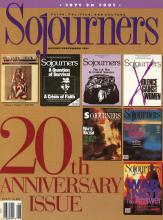"Up With Capitalism," exclaimed the May cover of Crisis magazine, a conservative Catholic monthly that featured articles on "the Pope's economic discovery" in his recent encyclical Centesimus Annus. "The Pope Affirms the 'New Capitalism,'" boasted the title of a column written by Richard John Neuhaus in the May 2 Wall Street Journal. "New Encyclical Praises Freedom and Enterprise," proclaimed the lead article in the June newsletter of the Institute for Religion and Democracy.
Has the Pope indeed blessed capitalism as the economic answer to our prayers in the wake of the failure of communism in Eastern Europe? Or is this a case of sophisticated spin control and proof-texting on the part of the most adamant free market hopefuls in the Catholic Church?
These are the questions fueling a lively debate in Catholic circles in recent weeks, with a number of Catholic commentators suggesting the latter is the case. In a May 25 editorial, the editors of the weekly Catholic journal America wrote: "The Pope specifically warns the Western countries that they risk seeing communism's collapse as a one-sided victory for their own system and thus might fail to correct it in accord with Christian social teaching."
In a May 24 letter to The Wall Street Journal, Monsignor George Higgins -- who was a spokesperson for the U.S. bishops on social issues for more than 25 years -- criticized Neuhaus for suggesting that the new encyclical negates the bishops' 1986 pastoral letter on economics. Higgins, who now teaches at the Catholic University of America, said the 1986 pastoral and the recent encyclical accepted capitalism's "good qualities" while insisting that "it needs to be controlled by other forces in society."
Read the Full Article
